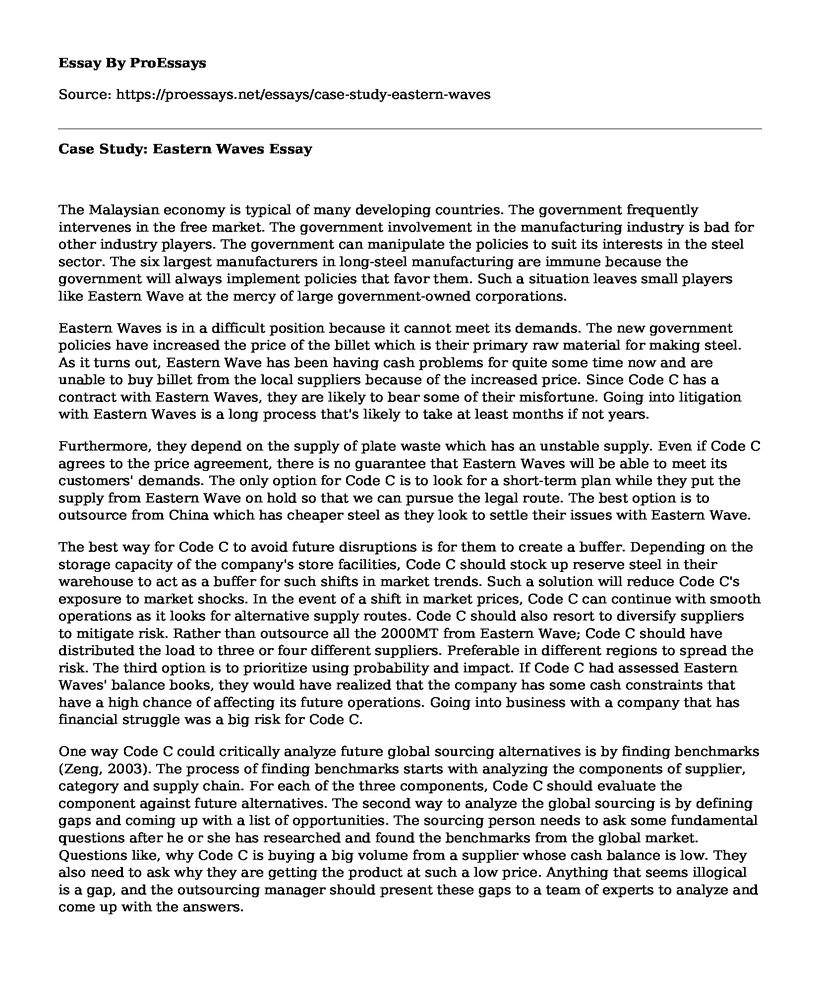The Malaysian economy is typical of many developing countries. The government frequently intervenes in the free market. The government involvement in the manufacturing industry is bad for other industry players. The government can manipulate the policies to suit its interests in the steel sector. The six largest manufacturers in long-steel manufacturing are immune because the government will always implement policies that favor them. Such a situation leaves small players like Eastern Wave at the mercy of large government-owned corporations.
Eastern Waves is in a difficult position because it cannot meet its demands. The new government policies have increased the price of the billet which is their primary raw material for making steel. As it turns out, Eastern Wave has been having cash problems for quite some time now and are unable to buy billet from the local suppliers because of the increased price. Since Code C has a contract with Eastern Waves, they are likely to bear some of their misfortune. Going into litigation with Eastern Waves is a long process that's likely to take at least months if not years.
Furthermore, they depend on the supply of plate waste which has an unstable supply. Even if Code C agrees to the price agreement, there is no guarantee that Eastern Waves will be able to meet its customers' demands. The only option for Code C is to look for a short-term plan while they put the supply from Eastern Wave on hold so that we can pursue the legal route. The best option is to outsource from China which has cheaper steel as they look to settle their issues with Eastern Wave.
The best way for Code C to avoid future disruptions is for them to create a buffer. Depending on the storage capacity of the company's store facilities, Code C should stock up reserve steel in their warehouse to act as a buffer for such shifts in market trends. Such a solution will reduce Code C's exposure to market shocks. In the event of a shift in market prices, Code C can continue with smooth operations as it looks for alternative supply routes. Code C should also resort to diversify suppliers to mitigate risk. Rather than outsource all the 2000MT from Eastern Wave; Code C should have distributed the load to three or four different suppliers. Preferable in different regions to spread the risk. The third option is to prioritize using probability and impact. If Code C had assessed Eastern Waves' balance books, they would have realized that the company has some cash constraints that have a high chance of affecting its future operations. Going into business with a company that has financial struggle was a big risk for Code C.
One way Code C could critically analyze future global sourcing alternatives is by finding benchmarks (Zeng, 2003). The process of finding benchmarks starts with analyzing the components of supplier, category and supply chain. For each of the three components, Code C should evaluate the component against future alternatives. The second way to analyze the global sourcing is by defining gaps and coming up with a list of opportunities. The sourcing person needs to ask some fundamental questions after he or she has researched and found the benchmarks from the global market. Questions like, why Code C is buying a big volume from a supplier whose cash balance is low. They also need to ask why they are getting the product at such a low price. Anything that seems illogical is a gap, and the outsourcing manager should present these gaps to a team of experts to analyze and come up with the answers.
References
Zeng, A. Z. (2003). Global sourcing: process and design for efficient management. Supply Chain Management: An International Journal, 8(4), 367-379.
Cite this page
Case Study: Eastern Waves. (2022, Aug 30). Retrieved from https://proessays.net/essays/case-study-eastern-waves
If you are the original author of this essay and no longer wish to have it published on the ProEssays website, please click below to request its removal:
- Foreign Exchange Theories
- Social Problems and Social Work Essay Example
- Essay Example on Immigrants in US: Benefits & Impact on Labor Force
- Paper Example on Waging a Living: Does Work Provide Enough for Working Americans?
- Starbucks Dyslexia Case: Unfair Treatment of Employee
- Google: Employees Feel Proud & Admired, Satisfied Needs - Essay Sample
- Effective Performance Appraisal Systems - Essay Sample







